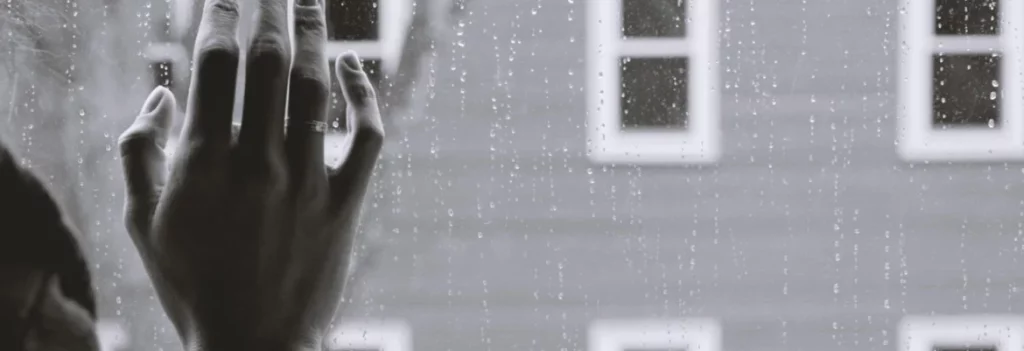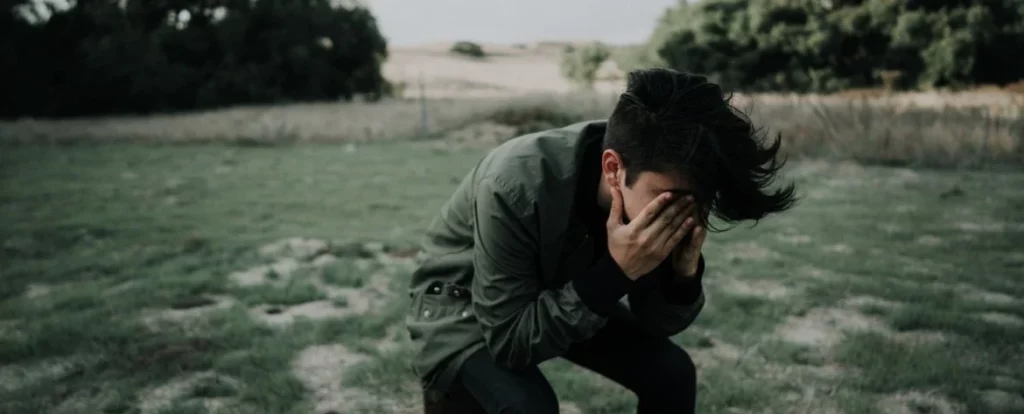Many people with stress will recognize this complaint; a feeling of pressure in the chest or pain in the chest. It is a frightening feeling and can create anxiety. Go to see your doctor if you are unsure about the symptoms. After all, it is very important that the cause is traced and any heart complaints or any underlying medical conditions are ruled out
We know from experience that stress is often the culprit of chest pain and a shortness of breath. By taking care of your stress and anxiety your life will improve in many ways.
Our breathing under stress
A feeling of pressure or tightness in the chest due to stress arises because people who experience a lot of anxiety and long-term stress tend to breathe incorrectly. This may be due to, among other things, hyperventilation or chronic hyperventilation (fast breathing.) A short and / or intensive chest breathing which can cause pain over a period time.
This pain results in a feeling of anxiety, as a result of which you experience more breathing difficulties and a shortness of breath, you feel like you’re suffocating or hungry for air, therefore you tend to breathe worse, (see diagram below). This way you get a self-sustaining circle that is driven by stress. To stop that you have to break the circle and deal with the cause of the stress.

The onset of complaints
Your breathing is an excellent indicator when it comes to peace of mind. If you are nice and relaxed, then you have a smooth calm breathing rhythm. If you are worried, or not looking forward to something, your body responds immediately. Your heart rate and blood pressure increases and your breathing goes faster. This is known as the fight-or-flight response. With anxiety, you may not be running for your life, but your body still responds as if you are.
Our breathing center is sensitive to stimuli such as stress, anxiety and depression. In these situations, your breathing moves your chest, reducing the amount of oxygen in your blood. The result is that the muscle tissue around your arteries, intestines, airways and your stomach, among other things, contract. This is one of the symptoms of unhealthy stress. Stress that we should avoid!
Symptoms of incorrect breathing
When we breathe through the chest, our breathing is too short and fast. The air in our lungs is not sufficient in oxygen and high in carbon dioxide. Shortness of breath and other physical symptoms, such as tightening of the chest and faster breathing occur because your body is trying to get more oxygen into your lungs.
- Physical symptoms include:
- Shortness of breath
- Faster breathing (hyperventilation)
- Chest tightness
- Breathlessness or a feeling of suffocation
- Fight or flight response
- Heart palpitations (feels like a stronger, faster heartbeat)
- Dizziness, unsteady or feeling faint
We are often concerned and worried by these complaints, creating even more stress and anxiety. This creates a vicious circle. Sitting down is not an option, stress only decreases if something is done about it. Time to take action, because pain is a sign in the body that something needs to be done.
What is hyperventilation?
Hyperventilation is a symptom of chronic stress and ‘a burnout.’ Your body reacts to the anxiety. It is in survival mode and has taken over control. Shortness of breath and other physical symptoms happen in the fight or flight response to protect you. Because of this survival mode you need extra oxygen and your body is preparing to take action.
The diaphragm makes an effort to provide a boost of oxygen when you are experiencing shortness of breathe from an anxiety attack. But with chronic stress or burnout, the diaphragm will no longer relax due to incorrect, shallow breathing. Your body gets used to the low carbon dioxide content and breathing gets disrupted. We call this hyperventilation.

From hyperventilation to a panic attack.
If you have an attack of hyperventilation, the low oxygen and high carbon dioxide content causes a strange feeling that can make you anxious. In some cases, this fear is so great that a ‘panic attack’ follows. This is accompanied by shortness of breathe, palpitations, nausea, excessive sweating, irritability and a tightness in the chest. Symptoms that are very similar to a heart attack.
A tightness in the chest, hyperventilation or a panic attack, all have something in common. They cause anxiety. When the pressure is too great whether this is at work, in your relationship or in your environment, fear arises. And fear is stress. Don’t let the fear or anxiety get a hold or grip of you! This article provides practical advice of how to deal with a panic attack caused by anxiety and fear which leads to hyperventilation and shortness of breathe and it may seem counterintuitive but that it is your breathing that you need to focus on. By focusing on your breathing, you can get it under control and the right amount of oxygen into your lungs.
Back to good breathing.
The main way to prevent shortness of breathe and other physical symptoms of anxiety is to practice techniques and learn your triggers when you are not experiencing them and you are in a calm state. Take a deep breathe which sends signals to the brain telling you to relax and calm down. A sigh has the same effect. In the event of stress we tend to breath superficially, we become tense which leads to a shortness of breathe.
When we are relaxed, we breath between 8 to 12 times per minute. For athletes, the rhythm is lower, between 6 and 10 times. Breathing takes no effort at all. We don’t even think about it, our breathing is smooth, regular and without sighing!

The difference between abdominal breathing and chest breathing.
Shortness of breathe when you are tense is an uncomfortable condition that makes it difficult to get air fully into your lungs. Breathing from your chest provides a short and less deep breathe. Your chest moves forward and up. This costs extra energy because you have to exert your muscles for both inhaling and exhaling whereas with abdominal breathing you tighten you muscles when inhaling. This way of breathing is healthier because your diaphragm goes down and the space in your chest becomes larger as a result. Your organs are pushed slightly forward, causing your stomach to expand a little. Abdominal breathing is the best breathing technique, it has a calming effect, making you breathe deeper and more calmly.
Are you unable to stop the oppressive feeling on your chest? Discover the reason for your stress together with a coach.
Coaching in case of stress
Do you breathe more often than 12 times a minute in a relaxed state or do you suffer from hyperventilation, then we have a good breathing tip for you.
Breathing Exercise: three times for three minutes a day.
- Sit up comfortably in a chair
- Place one hand on your upper chest and the other below your rib cage. This will allow you to feel better your diaphragm as you breathe.
- Breathe in slowly through your nose so your stomach moves out against your hand.
- Tighten your stomach muscles. Let them fall inward as you exhale through your nose or mouth. Stop for 2 or 3 seconds before you breathe in again.
In the beginning, try to take three minutes three times a day for this exercise. A good tip during the exercise is to think of nice things, a beautiful place or a good memory. Try to distract your thoughts from your complaints or problems and relax.
You may feel dizzy in the beginning because your body is unaccustomed to taking a breathe. But you will see that you become calmer. If you have back pain due to chronic hyperventilation, then it will also most likely decrease quickly.
When we inhale and exhale, our autonomous nervous system is activated. If you breathe in, your sympathetic part is called, or the accelerator pedal. By breathing out for longer, you actually put the brakes on. You can also feel this effect in your pulse rate. Your heart rate goes faster when your breath in and slows when you breathe out.

Remedies against chest pain and stress
As you read earlier our breathing plays a major role in the pressure or tightness of our chest. The medical world recommends that if you have benign chest pain caused by stress, you should exercise regularly, relax and learn to cope better
Are your stress complaints too severe and are you in a burnout? Healthy, non-exhausting sports are extremely beneficial when exercising. In case of incorrect breathing, this requires care, because increased breathing can cause anxiety.
Good nutrition serves as fuel for the body. Just as good wood on the wood burner provides warmth, so food also provides the body with energy.
Rest can be found in both sleep and relaxation

About Milltain
Milltain supports, with a team of experienced trainers, organizations in the prevention of stress and the (re) finding of work happiness in the workplace. Our training courses are aimed at managers within companies. A burnout quickly costs the organization € 70,000.
In addition to financial suffering, human suffering is great. Not only for the employee but also for close colleagues who have to deal with the blows. Before you know it you are in a negative vicious circle.
Do you want an effective approach to long-term absenteeism and increasing work pleasure? (instead of extinguishing continuous fires).
Related content
- Tingling, prickling or numbnes. How to solve it?
- Down with deadline stress – Stress-free deadlines thanks to good management
- A disturbed employment relationship with an employee – What now?






